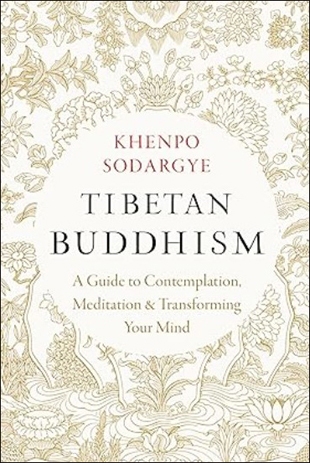You’ll find nearly 500 book reviews at Spirituality &Practice covering books about Tibetan Buddhism, but that doesn’t mean there will not be more, and this one does fill a gap.
Author Khenpo Sodargye Rinpoche was born in 1962 in the Tibetan region of Kham. At the age of 23, he was ordained and then became a lineage holder of the Dzogchen tradition, as well as a scholar at the largest Tibetan Buddhist institute in the world, in Sertar, which is also on the Tibetan Plateau in the region of Kham. (The Chinese refer to this area as Sichuan Province.) He is one of the most respected living Tibetan masters for his practice, his scholarship, and his personal qualities. This is not his first introduction to an English-speaking/reading audience, since he has taught extensively in North America over the last two decades.
Khenpo Sodargye Rinpoche’s book is a thorough, step-by-step guide to Tibetan Buddhist Dharma and practice. This is not a book for those seeking quick instructions and pithy quotations. The author guides would-be practitioners into the Dharma directly and systematically, with quotations from sutras and shastras as scriptural evidence and support, and then offers instruction on meditation as an essential companion to this Dharma. As the translators explain in a note at the beginning, “Once practitioners have gained intellectual understanding through hearing and contemplation, meditation develops into true realization, without any mistake.”
The book is designed for non-Tibetan Buddhists who desire to discover and practice authentic Tibetan Buddhism with a great teacher.
Chapters cover the heart of the Buddha’s life and teachings, the role of faith in Buddhism, bodhichitta (“becoming a Buddha for others”), rebirth and karma, the importance of spiritual teachers, the “three ways of developing wisdom: hearing, contemplation, and meditating,” and Vajrayana, also known as Tantric Buddhism.
In the final chapter, on Vajrayana, Khenpo Sodargye remarks, “While Vajrayana is extremely precious to us tantric practitioners, it may not necessarily be of benefit to unqualified recipients who could misunderstand or even slander it.” This may be a good summary of this book as a whole: serious students should apply.
Go Deeper:
Tonglen Meditation: Try a Tibetan Buddhist spiritual practice to widen your circle of compassion.
